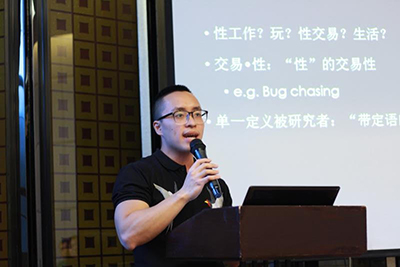
Yifeng Cai’s research lies at the intersection of sexuality, digital technology and health. This combination of study is made possible through Open Graduate Education, a program that allows doctoral students to earn a master’s degree in a second field. Cai is studying Anthropology for his PhD and Public Health for his master’s.
“Public health offers a good way to turn my anthropological findings into applicable and beneficial interventions,” says Cai.
His current project explores how dating apps influence how gay men in urban China understand and establish intimate relationships, as well as how China’s rapidly growing digital infrastructure produces new relationships between intimacy and currency in a post-socialist nation.
“With trainings in public health, I have been able to work with local NGOs that focus on improving the health outcomes for LGBTQ+ persons in China. As a result, the research findings are much more widely disseminated, leading to more palpable real-world impact, as well as wider social engagement with my scholarship from within and beyond academia,” says Cai.
By examining his research through both an anthropological and public health lens, Cai is able to make recommendations about how to create positive life changes for those who have participated in his research and more broadly for Chinese gay men in general.
He explains that while anthropology’s ethnographic approach produces fine-grained and in-depth data about a limited number of research participants, it is relatively difficult to turn these findings into large-scale interventions that can benefit a broader community. Similarly, while public health is particularly suited to study social problems from the perspective of a broad population, sometimes the nuances, particularities and culturally specificities are lost in quantitative data.
“Anthropology and public health complement each other, allowing my future research findings to be both theoretically deep and practically relevant,” says Cai.
The Open Graduate program not only brings together new fields of study, but the participating students often describe learn to think more critically about their graduate careers, coursework and big picture planning.
“Whenever I have to allocate time to different tasks, I always try to decide which task will have the most positive impact on my academic and career goals. It’s easy to lose sight of one’s path when there are many tasks competing for one’s time and attention.”
Cai also attributes his study in two fields to broadening his “scholarly worldview.” It has allowed him to engage in conversations with scholars in various disciplines and present at conferences he might not have attended with an Anthropology background alone, as well as publish articles and give guest lectures.
Tackling multiple areas of study is not without challenges. For Cai, learning how to switch between different modes of thought and production was new. He explains that Anthropology tends to be an individual-based field, while public health is largely team-based.
“I deliberately took courses and engaged projects that require teamwork with classmates. The best way to turn a challenging situation into a rewarding experience is by doing it,” says Cai.
After Brown, Cai aims to work as faculty, hopefully across disciplinary lines and to create “a new ‘species’ of academic inquiry that inherently draws on social sciences, health sciences, and the humanities.”
His favorite part of being a graduate student and in the Open Graduate Education program –travel.
Yifeng Cai is a third-year international graduate student from China. He completed his undergraduate degree in English from Renmin University of China and a Master’s in Education from the University of Pennsylvania.